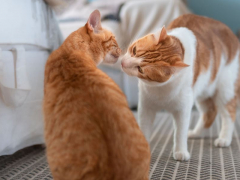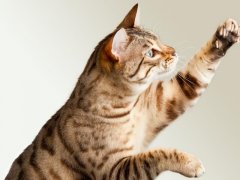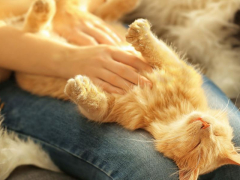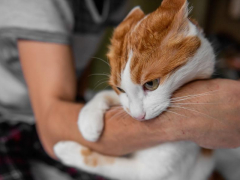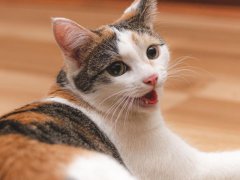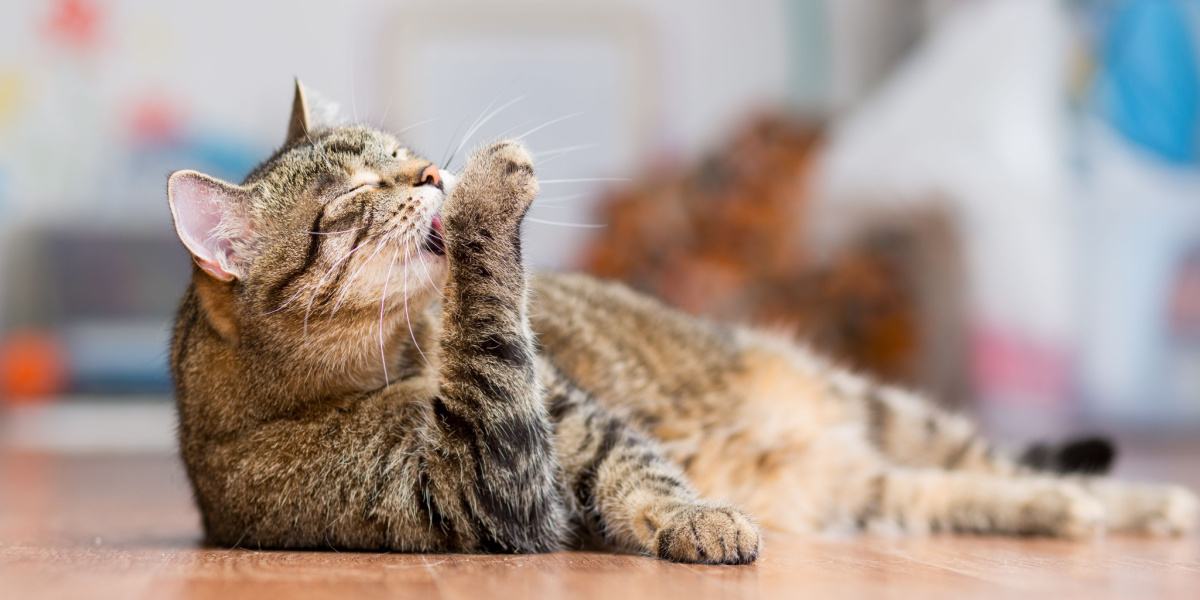
It’s no secret that cats are well-groomed. They have a specially designed tongue to help clean and untangle their coat, and they put it to good use.
Licking isn’t always just about cleanliness, though. Cats lick themselves for several completely normal reasons, but occasionally the licking might be a sign of a problem. Here we take a look at the common reasons cats lick and clean themselves and when you might need to seek help.
1. Cleanliness
Cats can spend a significant amount of time grooming each day. If your cat has ever licked you, you’ll probably have noticed that their tongue is quite rough and sandpaper-like.
Unlike the wet, slobbery lick you might expect from a dog, a cat’s lick is much drier and exfoliating. This is because they have barbs (also called papillae) on their tongue, specially designed for cleaning, detangling, and releasing natural oil (sebum) from the base of the hairs.
Dirt and loose hairs are removed from deep down in the coat, and sebum lubricates it, making it shiny and free of mats. This cleaning action also helps remove parasites like fleas. All in all, the inbuilt hairbrush in your cat’s tongue is pretty genius.
2. Heat Regulation
Did you know cats only have sweat glands in their paw pads? This can make cooling down on hot days a little challenging. As part of the grooming process, cats spread saliva all over their coats. As the saliva evaporates, it helps lower your cat’s body temperature. So don’t be surprised if you notice some vigorous licking on hot summer days.
3. Relaxation
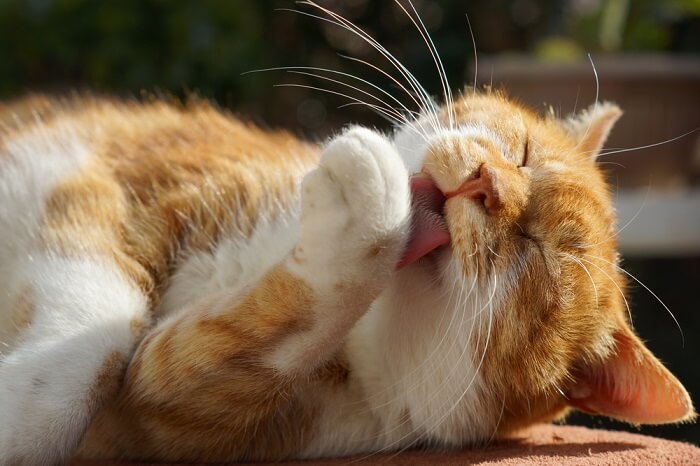
Cats are naturally clean, and enjoy licking and grooming themselves daily.
Most of us have experienced the relaxing feeling of a hair wash and head massage at the hairdressers. Cats can experience the same zen feeling from licking and cleaning themselves, effectively washing their worries away. A happy cat is a clean cat!
4. Socialization
Licking is a language in itself. Cats lick each other and their favorite humans as a sign of affection. This is also called allogrooming and is particularly common in cats that grow up together. So you might say that licking is sometimes more of a cat kiss.
5. After Mating
In addition to a spiky tongue, the male cat also has a spiky penis! This doesn’t go unnoticed by the female (the queen), who will often lick her rear end after mating because things are a little uncomfortable. Licking after mating may also play a part in getting rid of the smell of the male cat and help to attract more mates.
6. Odor Removal
Licking is also an effective way of removing food or smells that might attract predators. This instinctive cat behavior is particularly noticeable after giving birth when the queen licks away blood and discharge that might attract unwanted visitors.
7. Maternal Grooming
Maternal instinct is an important, normal reason for licking. Queens lick their young immediately after birth to clear the amniotic sacs from their faces and bodies and to help stimulate breathing. The umbilical cord and placenta also need removing, so queens will tend to chew through these.
During the first few weeks of life, the queen will regularly lick her kittens, especially on the stomach and around the rear end. This licking action helps the kittens to eliminate urine and feces and gradually teaches the youngsters how to groom themselves.
8. Displacement Behavior
As we already talked about, grooming can provide comfort. So, it’s perhaps not surprising that cats will lick and clean themselves as a coping mechanism in stressful situations, such as when they feel intimidated by another animal. This is a normal, short-lived behavior, but it can sometimes become obsessive.
Also Read: Why Does My Cat Like My Husband More Than Me?
When Is Licking A Problem?
We’ve looked at some common, normal reasons for licking, but you may be wondering when licking is a sign of a problem. It’s not always obvious, but here are some causes of abnormal licking and some specific signs to look out for.
1. Wounds
It’s not uncommon for cats to become injured, particularly if they go outdoors. Licking is your cat’s way of soothing irritation, cleaning the wound, and increasing blood flow to the area to aid healing.
Bite wounds or abscesses are common, so try to investigate if you notice your cat is focusing on a specific area. It might be as simple as something stuck in their coat, but it could also be something more serious like an infected wound that needs treatment. If your cat also seems a little under the weather, it may be a sign of infection and is definitely worth a quick checkup with your veterinarian.
2. Licking Lips
If your cat is licking or smacking their lips, they might be feeling nauseous. Some cats will vomit shortly after licking their lips. Ask your veterinarian to check your cat over if this behavior happens regularly or if they are showing any other signs of being unwell, like frequent vomiting, lethargy, or poor appetite.
3. Licking Genitals
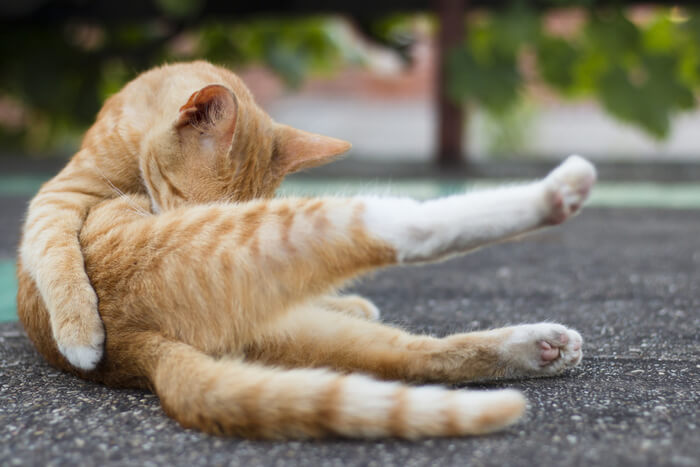
If you cat spends an abundant amount of time grooming around their rear, they might have a urinary issue.
Cats normally groom their nether regions, but this can also become excessive and indicate a urinary problem like a blockage or infection. If your cat is licking excessively at their genitals, look for other signs of a problem like frequent visits to the litter box, meowing when going to the toilet, blood in their urine, or no urine despite lots of trips to the litter box.
This can be an emergency, especially in male cats, as they can get life-threatening blockages. If your cat is showing any of these signs, you should take them to a veterinarian immediately.
4. Pain
Focused licking might indicate a painful area in the body. Cats might, for example, lick their bellies when they have pain or irritation in their bladder, or lick the fur over a painful joint. Excessive licking in one specific area or over large areas of the body often leads to bald patches, skin irritation, and hairballs in your cat’s stomach that they might vomit up.
5. Parasites And Allergies
Parasites are another common cause of excessive grooming. Fleas are pesky beasts, and some cats are allergic to them, which makes them even more irritating. This is a very itchy condition called flea allergy dermatitis. Cats can also be allergic to food and other things in their environment.
Allergic cats get itchy and overgroom, leaving patches of stubble where they have chewed through their hairs. Your veterinarian will be able to check and treat your cat for fleas and discuss a diet trial or allergy testing.
6. Stress
Displacement behavior can become excessive too. This is usually stress related and is called psychogenic alopecia. Cats with this condition tend to lick themselves bald on the belly. Talk to your veterinarian, as they will be able to help you figure out what is causing the stress and rule out other problems like pain and parasites.
If your cat is stressed, they might benefit from calming aids like pheromones or even anxiety medication, as well as avoiding the stressor where possible. Ask your veterinarian about the best options for your cat.
7. Not Licking
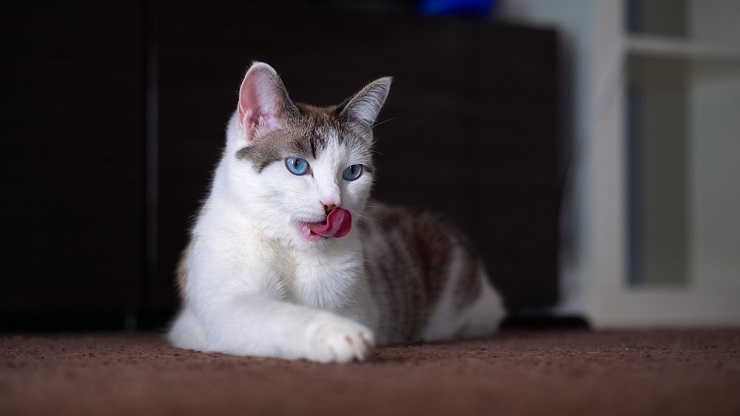
A cat that suddenly stops grooming themself might be sick or in pain.
Yes, not licking can also be a sign of a medical problem! Cats that are feeling unwell tend not to groom themselves as well or as frequently as usual. Be on the lookout for any change in grooming behavior, matted hair, and dandruff, as these warrant a checkup with your veterinarian.
In Summary
Cats take pride in their appearance. Licking and cleaning is a normal behavior in cats that can take up a fair bit of their time. Occasionally the grooming may become excessive and indicate an underlying problem like stress, allergy, pain, or urinary problems. Signs your cat is licking too much include focused licking, hair loss, and broken spiky hairs (stubble). Overgrooming warrants a checkup with your veterinarian.
Also Read: Is My Cat Bored? 8 Signs to Watch Out For
